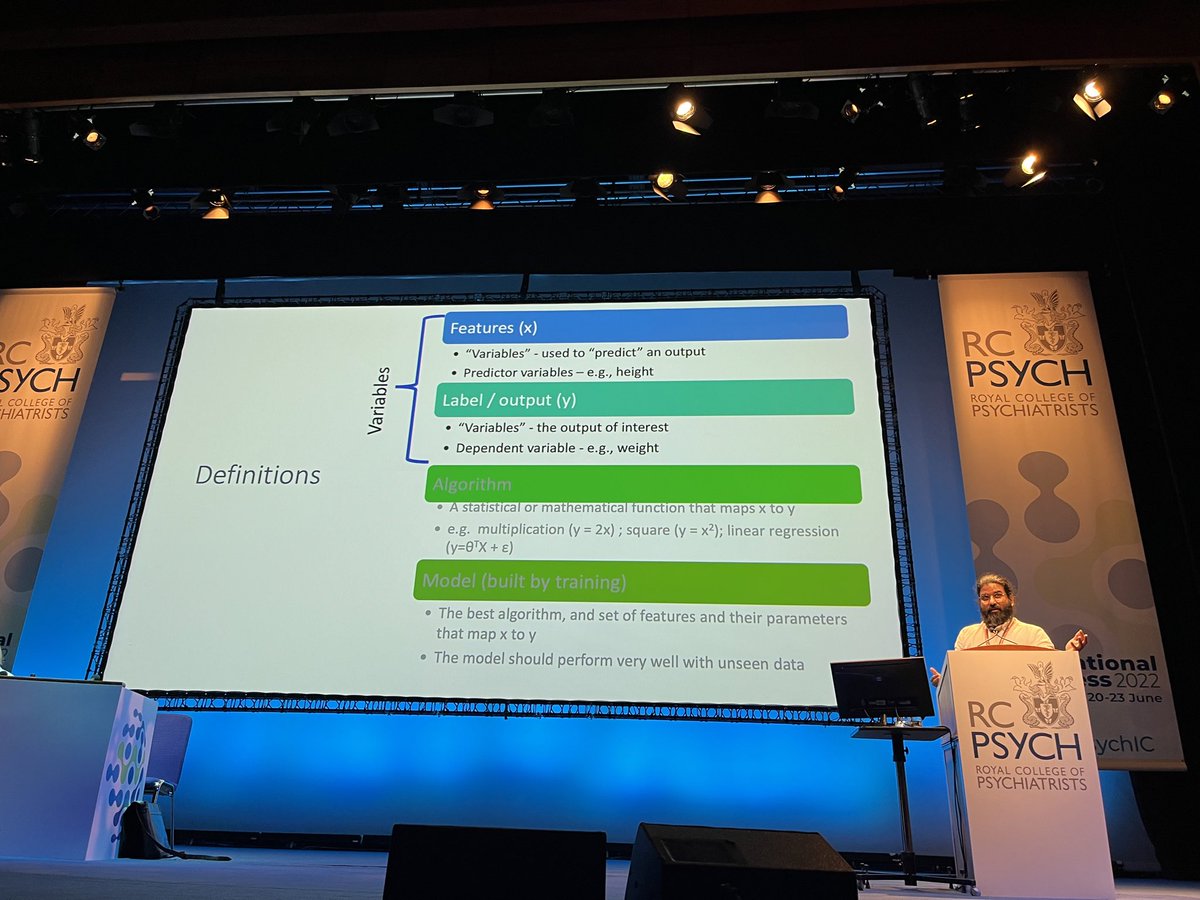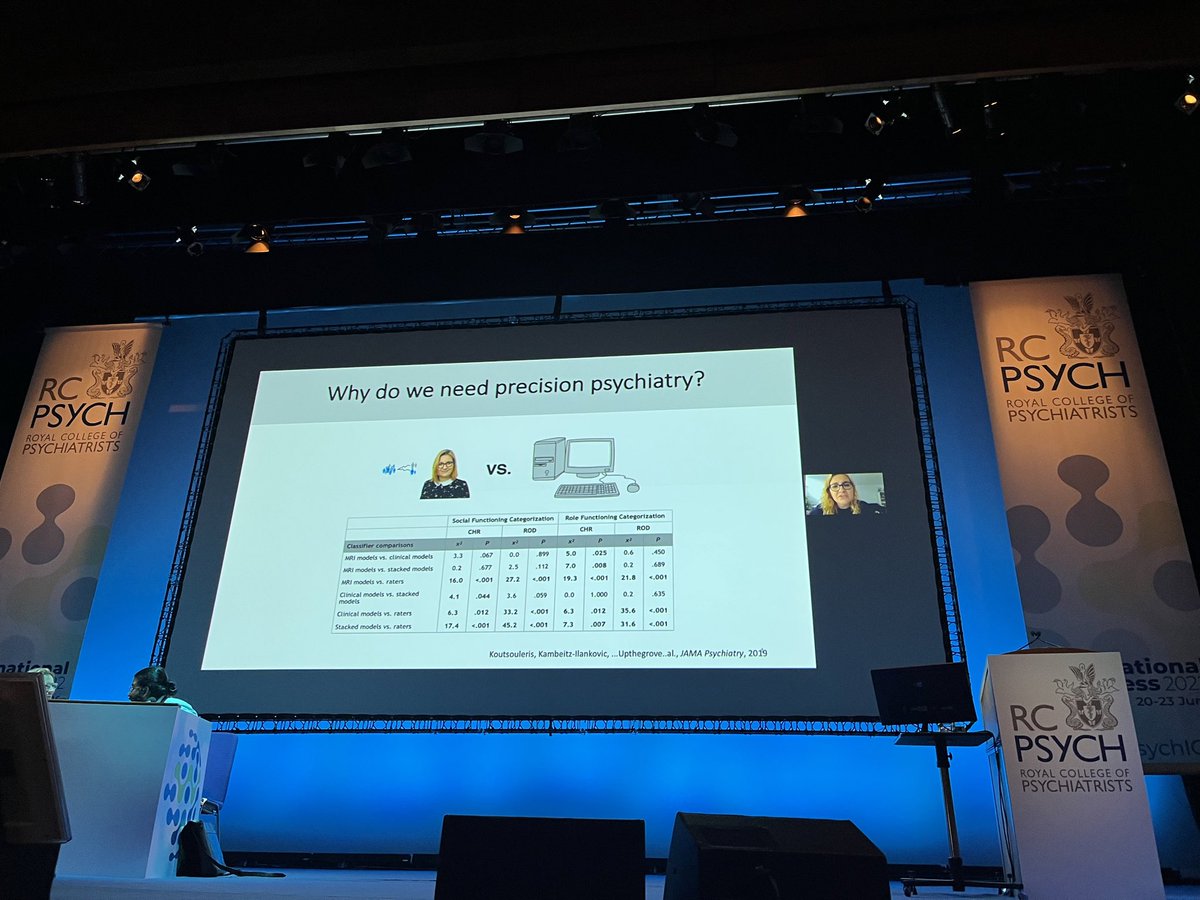Session S39 at #RCPsychIC is on ‘Precision medicine and personalised healthcare in psychiatry’ and is chaired by @RachelUTG.
This topic is the subject of a (free-to-view) @TheBJPsych themed issue:
cambridge.org/core/journals/…
This topic is the subject of a (free-to-view) @TheBJPsych themed issue:
cambridge.org/core/journals/…
First up in this session is Dr Rajeev Krishnadas (@WalkKD) from University of Glasgo. He was a guest editor for the BJPsych Special Issue and is talking about five points to consider when reading a translational machine learning paper.
#RCPsychIC
#RCPsychIC

Starts off with explaining what ‘machine learning’ is with a definition of:
“Set of approaches that estimate the best mathematical/statistical model that explain or predict the relationship between ‘variables’”
#RCPsychIC
“Set of approaches that estimate the best mathematical/statistical model that explain or predict the relationship between ‘variables’”
#RCPsychIC
Lots of definitions involved in machine learning!
Now explaining difference between supervised and unsupervised learning.
#RCPsychIC
Now explaining difference between supervised and unsupervised learning.
#RCPsychIC

Now talking about the different types of supervised learning algorithms. Can use machine learning in regression (linear and logistic) or classification modes.
#RCPsychIC
#RCPsychIC
What is the difference between explanation/inferential statistics vs prediction models? Gives examples:
Explanation/inferential: is there a relation between height and weight?
Prediction/model: given a person’s height, can we predict their weight?
#RCPsychIC
Explanation/inferential: is there a relation between height and weight?
Prediction/model: given a person’s height, can we predict their weight?
#RCPsychIC

Now we move on to what algorithms are. ‘A statistical or mathematical function that maps x to y’.
#RCPsychIC
#RCPsychIC
You can have multiple algorithms to explain your data set. The best algorithm, along with the parameters, is called the model.
Using more data will tend to lead to better models.
#RCPsychIC
Using more data will tend to lead to better models.
#RCPsychIC
Simple models may only use one parameter but more complex models will involve several parameters.
Raj makes an important point that the best explanatory models may not be the best prediction model.
#RCPsychIC
Raj makes an important point that the best explanatory models may not be the best prediction model.
#RCPsychIC
Sample size matters. Smaller samples will lead to biased estimates. Especially when there are a large number of predictors and small number of outcomes.
#RCPsychIC
#RCPsychIC
There are various performance measures of a model.
Real-world utility of a model can be measured through ‘net-benefit analyses’.
#RCPsychIC
Real-world utility of a model can be measured through ‘net-benefit analyses’.
#RCPsychIC

We now move to a pre-recorded talk by Dr Lana Kambeitz-Illankovic (@KambLana), University of Cologne and Guest Editor for the BJPsych Special Issue. Her talk title ‘The potential of precision psychiatry: what is in reach?’
#RCPsychIC
#RCPsychIC
Reiterating that it is important to separate out training and testing sets to avoid overfitting your model.
#RCPsychIC
#RCPsychIC
Closes her talk by talking about closed world problem vs open world problem and the relevance for psychiatry.
#RCPsychIC
#RCPsychIC

Now on to ‘The Ethics of Precision Psychiatry in Clinical Practice’ by @nataliemlane from Department of Psychiatry, Gartnavel Royal Hospital
#RCPsychIC
#RCPsychIC

Natalie starts by talking about autonomy and the need for informed consent and shared decision making.
Precision psychiatry models pose challenges for this. Some models have a lack of transparency. They may also have uncertain real world predictive accuracy.
#RCPsychIC
Precision psychiatry models pose challenges for this. Some models have a lack of transparency. They may also have uncertain real world predictive accuracy.
#RCPsychIC
Explaining the various challenges to autonomy presented by use of models in precision psychiatry.
#RCPsychIC
#RCPsychIC

Recommendations to deal with this include maximising transparency (simplify models and educate model users).
Also need to provide real-world accuracy (with external validation).
Also need to support patients and think about how complex models are explained.
#RCPsychIC
Also need to provide real-world accuracy (with external validation).
Also need to support patients and think about how complex models are explained.
#RCPsychIC
What benefits could we hope to see from use of precision psychiatry models?
Could lead to early intervention and optimised treatment choices. Benefits need to outweigh risks and costs (including discrimination).
#RCPsychIC
Could lead to early intervention and optimised treatment choices. Benefits need to outweigh risks and costs (including discrimination).
#RCPsychIC
Risk that models may perform differently on groups if training data is biased (especially with respect to gender and ethnicity).
#RCPsychIC
#RCPsychIC
Final consideration relates to data sharing. People are sometimes consenting in advance to their data being used in a range of ways, which might all be specified in detail.
It can also lead to involvement of big tech companies which are involved in collecting data.
#RCPsychIC
It can also lead to involvement of big tech companies which are involved in collecting data.
#RCPsychIC
• • •
Missing some Tweet in this thread? You can try to
force a refresh
















